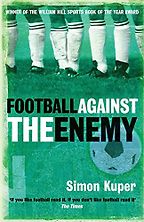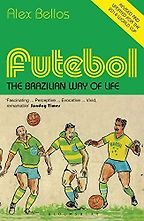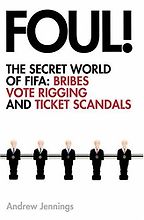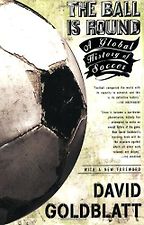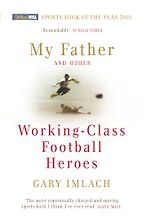Let’s discuss your first book choice, Football Against the Enemy, by Simon Kuper.
For me that was the first book that really tried to look at football through the political lens. It was just ahead of the 1994 World Cup in the US and it tells you just as much today as it did then. It set the template for a whole genre of using football to explain a whole country. He talks about the enmity between Holland and Germany told through football and he has a lovely chapter on Cameroon, and on Roger Milla [who scored four goals for Cameroon at the age of 38] at the World Cup in 1990.
Who is the enemy for Cameroon?
For the people, you could argue that the enemy is the government. You have an autocratic regime that has used football to boost its own popularity and as a diversion from the problems they themselves have caused.
Do you think football fans take on the enmity even when they don’t understand where it comes from?
Yes. English fans will sing along against Germany: ‘Two world wars and one World Cup…’ and a lot of them not only weren’t alive for the wars, they weren’t even alive for the 1966 World Cup. I think these things often become part of the national psyche. Look at what happened in Egypt when they played Algeria last year. After Egypt lost there were riots in the streets – the government was very adept at turning that anger against Algeria, making it about politics not football.
What about the Alex Bellos book, Futebol: The Brazilian Way of Life?
It’s a magical, magical book. I didn’t have much interest in Brazil as a country. I know that it’s there and I know about its football, but this book tells the story of the whole country by telling the story of its football.
There are several fascinating stories, although my favourite is probably the tale of Brazil hosting the World Cup for the first time in 1950. They built a new stadium, the Maracan, which was the biggest in the world – for 200,000 people. We think of Brazil as the greatest ever World Cup side but back then they still hadn’t ever won it. Everyone was so confident they would win in 1950 that the newspapers anointed them champions the day before the final. They lost 2-1.
Out of the ashes of that came the Brazil that we know now. And, in fact, the famous kit that they wear now, the yellow shirt and the green top, came from a competition they held afterwards when they decided they had to change absolutely everything, including the colour of their kit. And less well-known stories about the players, like Garrincha, who was this bow-legged boy who became one of the best footballers in the world. It’s a beautiful way of telling the story of a country. I wouldn’t pick up a book about Brazilian history, but a book about Brazilian football; I would and I did and it taught me more about Brazil than anything else I’ve read. The book starts with a Brazilian footballer playing in Scotland’s Faroe Islands, showing how football had become Brazil’s main export, and how global Brazilian football had become.
Next you’ve chosen Foul, by Andrew Jennings.
Like a lot of sports, football has become incredibly more commercial over the past 30/40 years. This World Cup in South Africa is a world away from the World Cup in England in 1966. There were no sponsors, there were no official partners, no sponsored ball-boys, none of this. Football began to change in the 1970s and FIFA is now an incredibly rich and powerful body, but incredibly corrupt as well and, for all its talk about transparency, it’s actually one of the least transparent organisations in the world. Andrew Jennings is a top investigative journalist and has done all sorts of things that people would consider more serious, but he has really lifted the lid on how corrupt some parts of the modern-day game really are. He is the only journalist who has ever been banned from FIFA press conferences. Sepp Blatter absolutely hates him. Blatter has been the president of FIFA since 1998. Football is incredibly undemocratic. You get people who have been in power for years and years and years and they nobble their opponents so they get to carry on.
Does it matter? Why do we care? Isn’t the game the same?
No. And it’s our game. It’s not theirs. These men are making millions and millions of pounds out of our game and, at the same time, claiming that everything’s going back into the game and that they love football. They are getting incredibly rich out of the game. It’s one thing for Ronaldo to earn a quarter of a million pounds a week, though I do have a problem with that. But you can argue that he’s one of the best footballers in the world and he’s providing something and earning that money. But the people who run the game are getting lots of money that they really shouldn’t. We don’t know how much because, for example, Sepp Blatter refuses to reveal what his salary is. It’s supposed to be the people’s game. Yes, it matters. It’s about the game’s soul and these guys have sold that soul. And they are quite happy about that.
Is anyone apart from Andrew Jennings doing anything about it?
Not really, no. Apart from shedding light on it, it’s very difficult to see what can be done about it. FIFA officials are elected by individual Football Association officials and they are often as corrupt as FIFA officials. The other problem is that a lot of football journalists would rather not get involved because if you start doing it you aren’t going to be able to cover the World Cup. It’s tricky, to say the least.
The Ball is Round, David Goldblatt.
This book is incredible. I want to show you exactly how big it is. It’s enormous. It’s 1,000 pages, give or take. Huge. Heavy as a brick. It’s a global history of football and it really is as in-depth as that. The thing I love about it is the scale. He could have done a 300-page book on this that gave you a flavour of it and his publishers would probably have been happier about it. Easier to sell. But instead he has written the definitive history. Not just the games and the goals but what it means all over the world. God knows how long it took him or if he planned for it to be quite this all-encompassing when he started. It really is an incredible achievement. He takes you from how it was played as a working-class sport in Britain in the late 1800s and how the colonialists from Britain, France and Portugal took it with them to the rest of the world, obviously to Africa, but to other parts of the world as well. He takes you through the birth of the World Cup in 1930, something the Brits were very unhappy about.
Were we? Why?
Well. It was their game. Other people can play it, but the idea of there being a World Cup that they didn’t organise…
And that they might lose?
Well, yes. When England did finally enter the World Cup in 1950 they then lost to America.
Ouch.
Yes, we don’t like to talk about it, but I’m sure it will get talked about this week because England’s first game is against the US, 60 years on from when they first met. So it’s an epic book. Absolutely epic and deeply, deeply impressive. It’s one of those books it’s always nice to go back and have a little look at every now and then. It’s got so many fantastic stories. And the guy can write.
My Father and Other Working-Class Heroes.
It’s a beautiful social history from a time when – it’s clichéd but true – footballers lived in the same area as the fans, they drank in the same pubs with the fans, caught the bus to the game with the fans. There was a maximum wage so there was none of your 170 grand a week. They were all ordinary working people. It’s written by Gary Imlach, a sports TV journalist, and it’s about his father, Stewart, who was a professional footballer in the 50s. He had a successful career, making the Scotland World Cup squad in 1958 and played in an FA Cup Final with Nottingham Forest. But it was a time when football had a maximum wage – on average, footballers earned less than factory workers. Imlach was sold between clubs without being asked. He was a commodity, owned by his club.
What makes this book stand out is that you don’t have to care about football to read this – it’s a beautiful social history of Britain. Working-class Britain, that is.
Tell me about your own book.
My book is called Africa United and it tells the story of football in 13 countries and uses football as a way of telling the wider story about those countries and of Africa as a whole. I’ve been based in Nairobi since 2006 and when I first moved here I was trying to get my head round Kenyan politics, which is incredibly hard to understand. There are all sorts of issues of ethnicity and corruption and money and at the same time, as a football fan, I was interested in the local football scene. But that was similarly complicated. There were two rival football associations, both claiming to be organising the local league and both setting up fixtures for the same teams on the same days in different places. The whole thing was a mess. I realised that the same issues that bedevilled Kenyan politics also had an effect on football. As soon as I started to understand one, the other became very clear. I thought, if I can understand Kenyan politics by understanding Kenyan football, is this the same elsewhere on the continent?
African football has such a high profile and most clubs have an African player, but we know very little about where they come from. In the run-up to the first World Cup in Africa I thought there was an opportunity to put these African stars in context. Some of the chapters are about countries like Somalia where the fact they have a national football team at all is a huge achievement for them and it really is the playing that counts, not the winning. The stories of how they have to avoid gun battles and roadblocks just to get to training in the mornings give you the story of modern-day Somalia
And South Africa?
This is interesting because sport played such a large part in the anti-apartheid movement – the international boycott and the fact that their rugby and cricket teams couldn’t tour England and the football team couldn’t play at the World Cup. All those things were important in organising a popular campaign, but also football was one of the few things in apartheid South Africa that wasn’t banned for blacks. So you had black football associations and matches were the only places where large numbers of black people were allowed to gather, and they talked politics in the changing rooms.
Get the weekly Five Books newsletter
Post-apartheid, if you ask anyone outside the country to name a major sporting event they’ll say the rugby world cup in 1995 when all the Springboks supporters were chanting Mandela’s name. If you ask most South Africans, though, it was a year later when they hosted the African Cup of Nations and they won it and, again, Nelson Mandela was there, wearing the team’s colours. But this was the big South African sport rather than the white minority sport and also the team was a real reflection of South Africa; it was a multi-racial team. To win that and to show that, yes, we’re back in a sport we really care about… And now the hope is the same again – they’re not going win the World Cup but they can show what South Africa has become and what it hopes to become in the future.
June 8, 2014. Updated: October 4, 2022
Five Books aims to keep its book recommendations and interviews up to date. If you are the interviewee and would like to update your choice of books (or even just what you say about them) please email us at [email protected]
Five Books interviews are expensive to produce. If you've enjoyed this interview, please support us by donating a small amount.
